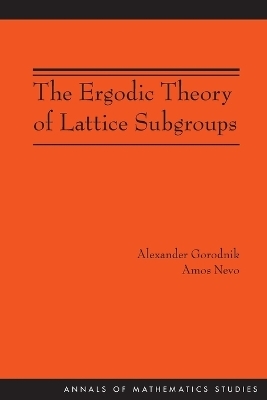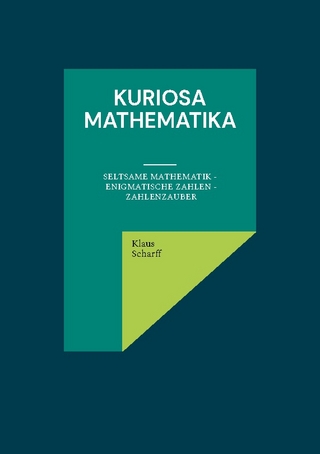
The Ergodic Theory of Lattice Subgroups
Princeton University Press (Verlag)
978-0-691-14185-5 (ISBN)
The results established in this book constitute a new departure in ergodic theory and a significant expansion of its scope. Traditional ergodic theorems focused on amenable groups, and relied on the existence of an asymptotically invariant sequence in the group, the resulting maximal inequalities based on covering arguments, and the transference principle. Here, Alexander Gorodnik and Amos Nevo develop a systematic general approach to the proof of ergodic theorems for a large class of non-amenable locally compact groups and their lattice subgroups. Simple general conditions on the spectral theory of the group and the regularity of the averaging sets are formulated, which suffice to guarantee convergence to the ergodic mean. In particular, this approach gives a complete solution to the problem of establishing mean and pointwise ergodic theorems for the natural averages on semisimple algebraic groups and on their discrete lattice subgroups. Furthermore, an explicit quantitative rate of convergence to the ergodic mean is established in many cases. The topic of this volume lies at the intersection of several mathematical fields of fundamental importance.
These include ergodic theory and dynamics of non-amenable groups, harmonic analysis on semisimple algebraic groups and their homogeneous spaces, quantitative non-Euclidean lattice point counting problems and their application to number theory, as well as equidistribution and non-commutative Diophantine approximation. Many examples and applications are provided in the text, demonstrating the usefulness of the results established.
Alexander Gorodnik is senior research fellow in mathematics at the University of Bristol. Amos Nevo is professor of mathematics at the Technion, Israel Institute for Technology.
Preface vii 0.1 Main objectives vii 0.2 Ergodic theory and amenable groups viii 0.3 Ergodic theory and nonamenable groups x Chapter 1. Main results: Semisimple Lie groups case 1 1.1 Admissible sets 1 1.2 Ergodic theorems on semisimple Lie groups 2 1.3 The lattice point-counting problem in admissible domains 4 1.4 Ergodic theorems for lattice subgroups 6 1.5 Scope of the method 8 Chapter 2. Examples and applications 11 2.1 Hyperbolic lattice points problem 11 2.2 Counting integral unimodular matrices 12 2.3 Integral equivalence of general forms 13 2.4 Lattice points in S-algebraic groups 15 2.5 Examples of ergodic theorems for lattice actions 16 Chapter 3. Definitions, preliminaries, and basic tools 19 3.1 Maximal and exponential-maximal inequalities 19 3.2 S-algebraic groups and upper local dimension 21 3.3 Admissible and coarsely admissible sets 21 3.4 Absolute continuity and examples of admissible averages 23 3.5 Balanced and well-balanced families on product groups 26 3.6 Roughly radial and quasi-uniform sets 27 3.7 Spectral gap and strong spectral gap 29 3.8 Finite-dimensional subrepresentations 30 Chapter 4. Main results and an overview of the proofs 33 4.1 Statement of ergodic theorems for S-algebraic groups 33 4.2 Ergodic theorems in the absence of a spectral gap: overview 35 4.3 Ergodic theorems in the presence of a spectral gap: overview 38 4.4 Statement of ergodic theorems for lattice subgroups 40 4.5 Ergodic theorems for lattice subgroups: overview 42 4.6 Volume regularity and volume asymptotics: overview 44 Chapter 5. Proof of ergodic theorems for S-algebraic groups 47 5.1 Iwasawa groups and spectral estimates 47 5.2 Ergodic theorems in the presence of a spectral gap 50 5.3 Ergodic theorems in the absence of a spectral gap, I 56 5.4 Ergodic theorems in the absence of a spectral gap, II 57 5.5 Ergodic theorems in the absence of a spectral gap, III 60 5.6 The invariance principle and stability of admissible averages 67 Chapter 6. Proof of ergodic theorems for lattice subgroups 71 6.1 Induced action 71 6.2 Reduction theorems 74 6.3 Strong maximal inequality 75 6.4 Mean ergodic theorem 78 6.5 Pointwise ergodic theorem 83 6.6 Exponential mean ergodic theorem 84 6.7 Exponential strong maximal inequality 87 6.8 Completion of the proofs 90 6.9 Equidistribution in isometric actions 91 Chapter 7. Volume estimates and volume regularity 93 7.1 Admissibility of standard averages 93 7.2 Convolution arguments 98 7.3 Admissible, well-balanced, and boundary-regular families 101 7.4 Admissible sets on principal homogeneous spaces 105 7.5 Tauberian arguments and Holder continuity 107 Chapter 8. Comments and complements 113 8.1 Lattice point-counting with explicit error term 113 8.2 Exponentially fast convergence versus equidistribution 115 8.3 Remark about balanced sets 116 Bibliography 117 Index 121
| Erscheint lt. Verlag | 11.10.2009 |
|---|---|
| Reihe/Serie | Annals of Mathematics Studies |
| Zusatzinfo | 2 line illus. |
| Verlagsort | New Jersey |
| Sprache | englisch |
| Maße | 152 x 235 mm |
| Gewicht | 227 g |
| Themenwelt | Mathematik / Informatik ► Mathematik ► Arithmetik / Zahlentheorie |
| ISBN-10 | 0-691-14185-1 / 0691141851 |
| ISBN-13 | 978-0-691-14185-5 / 9780691141855 |
| Zustand | Neuware |
| Informationen gemäß Produktsicherheitsverordnung (GPSR) | |
| Haben Sie eine Frage zum Produkt? |
aus dem Bereich


